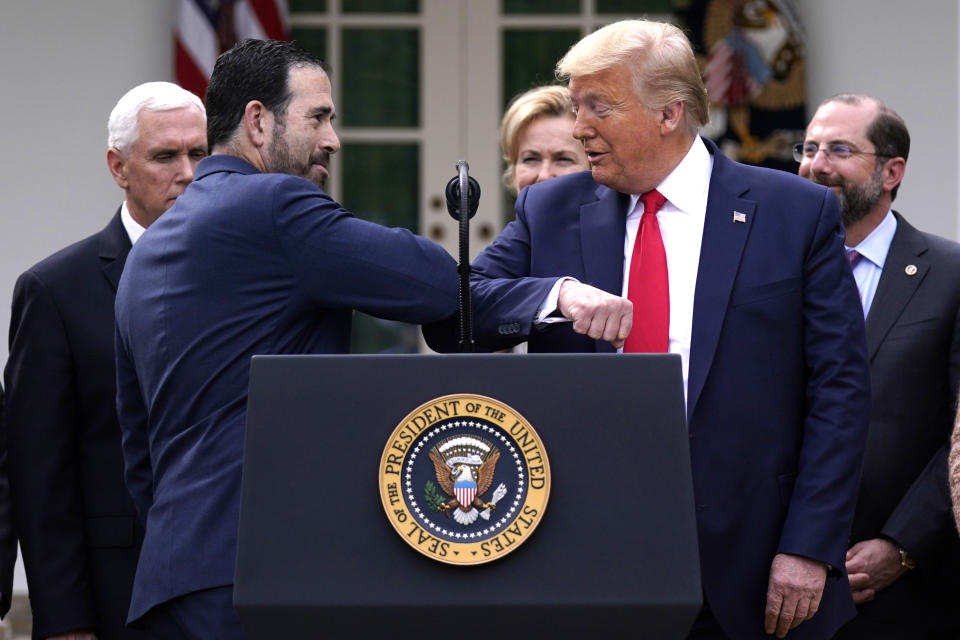President Trump says he'll 'most likely' get tested for coronavirus
WASHINGTON — President Trump said Friday afternoon that he would “most likely” be tested “fairly soon” for the coronavirus, reversing course from his administration’s dismissal of the need to do so earlier in the week.
“We’re working on a schedule,” he said at a White House press conference, when asked repeatedly by reporters why he was not in isolation after being exposed last weekend to a person who has now tested positive for the illness.
Trump has been in contact with at least two individuals who later tested positive for the coronavirus. On Saturday he was photographed standing side by side with Fabio Wajngarten, press secretary for Brazilian President Jair Bolsonaro, in Florida, holding a hat that was given to him as a gift that featured the slogan “Make Brazil Great Again.”
There is also confusion over whether Bolsonaro himself has tested positive. News reports from Brazil initially said he had, but Bolsonaro later denied that, saying he had tested negative.

Miami Mayor Francis Suarez, who attended some of the events involving the Brazilian delegation, announced Friday morning that he had tested positive for COVID-19.
Trump has also been in contact with members of Congress who went into self-quarantine after being exposed to individuals who later tested positive.
Staff at Mar-a-Lago, the president’s estate and club in Florida where he often spends time and where he met with Bolsonaro, sent a note to members saying that they were “washing the place down a couple times a day.”
But White House press secretary Stephanie Grisham said Thursday there was no need for Trump or Vice President Mike Pence to be tested.
“Both the president and vice president had almost no interactions with the individual who tested positive and do not require being tested at this time,” Grisham said.
Trump, on Friday at the press conference, downplayed concerns about his exposure to Wajngarten.
“I don’t know that I had exposure, but I don’t have any of the symptoms,” Trump said.
The president also repeatedly said that he didn’t know Wajngarten and that he had not seen the photo of the two of them together. He said he took “hundreds of pictures” with people that night, and that his interaction with Wajngarten would have lasted only a few seconds.
But the president’s failure to be tested already could mean that if he is infected he could become a “super-spreader” of the illness, a public health expert said.

“COVID-19 is highly transmittable. Anyone who comes within 6 feet of an infected person could be infected themselves and then could be spreading it to others,” said Leana Wen, MD, the former Baltimore City health commissioner, who is now an emergency physician and professor at George Washington University.
“There could be people who have mild symptoms or no symptoms at all and could be spreading it to others. When you have individuals who are in contact with many people over the course of the day, they could become super-spreaders themselves if they do not yet know that they are infected,” Wen told Yahoo News in an interview.
Wen defined a “super-spreader” as someone who infects more than the two to three people who are sickened by the average virus carrier.
“There are some people who end up spreading the virus to many more. The more people one is in contact with, the more they could potentially spread the disease,” she said.
Wen said the president’s delay went against basic public health protocols.
“The standard public health practice is to test all contacts, so at a time of a public health emergency, when containment is key, everyone should abide by public health principles no matter their position or their title,” she said.
“Individual actions make a big difference. I realize it’s a challenging time for all of us. Some people may find the idea of testing to be personally uncomfortable. However, this is about the public’s health, about protecting the health of the community,” she said.
_____
Read more from Yahoo News:



